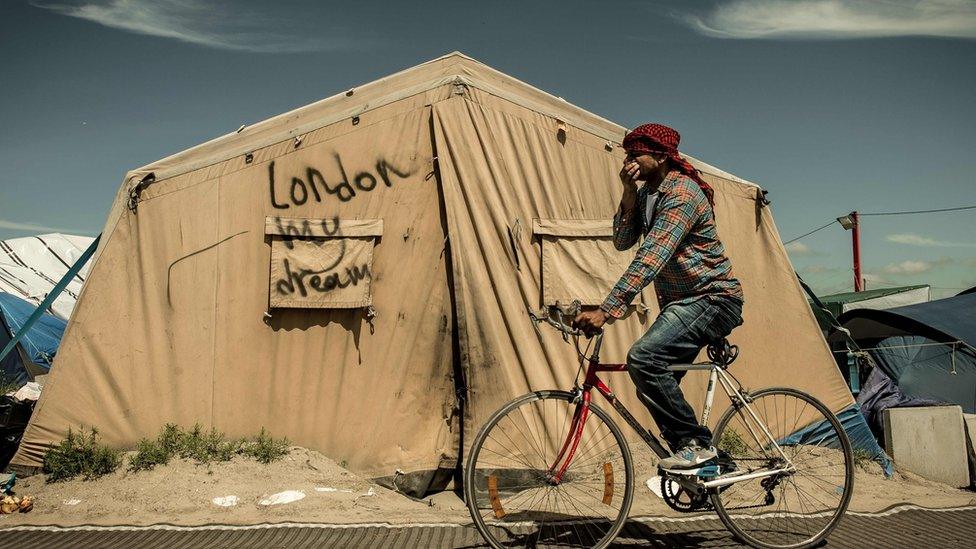Calais migrants: Hollande sets out plan to close Jungle camp
- Published

Up to 9,000 migrants are stuck in Calais as they wait to reach the UK
French President Francois Hollande has said he intends to close the "Jungle" camp in Calais and move 9,000 migrants to reception centres across France.
Setting out for the first time detailed plans to deal with the camp, Mr Hollande said migrants would be given up to four months to seek asylum.
He has faced criticism over the squalid conditions in Calais, which he acknowledged were "unacceptable".
His comments came as other EU leaders met in Vienna to discuss the crisis.
The Jungle camp has become a powerful symbol of Europe's failure to cope with the crisis unfolding from Africa and the Middle East.
Half of the camp was dismantled earlier this year, and with immigration likely to be a key issue in next year's French presidential election, Mr Hollande is keen to close the rest.


Explaining his plans during a visit to a reception centre in Tours, about 150 miles (240km) south-west of Paris, he said reception centres would hold 40 to 50 people for up to four months.
During that time, the migrants can apply for asylum in France. Those who are unsuccessful will be deported.
About 7,000 migrants live in the remaining half of the camp, up from 4,500 in June, according to local authorities. Humanitarian groups put the number closer to 9,000.

"There should be no camp in France," said Mr Hollande, who is expected to visit the site on Monday.
The Jungle has played host to scenes of both squalor and of violence, as migrants attempt to board lorries bound for the UK, clashing with drivers and police in the process.
Merkel meets Balkan leaders
German Chancellor Angela Merkel travelled to Vienna on Saturday to discuss the migrant crisis with the leaders of countries along Europe's Balkan migrant route.
Mrs Merkel, who suffered an election blow last week brought on in part by her controversial "open-door" policy, met Hungary's premier Victor Orban, Alexis Tsipras of Greece, and Boyko Borisov of Bulgaria.
Mr Orban has been openly critical of Mrs Merkel's approach and taken a hard line against refugees and migrants entering Hungary.
Austrian Chancellor Christian Kern said the aim of the talks was to "accelerate" a solution to the crisis.
"At the moment there is a range of individual measures but no common European line," Mr Kern told the Austrian Kleine Zeitung daily.
EU President Donald Tusk, arriving in Vienna, said that it was necessary "to confirm, politically and in practice, that the western Balkan route of irregular migration is closed for good."
More than 300,000 migrants have crossed the Mediterranean this year, the UN said on Tuesday, with 3,500 deaths recorded so far.